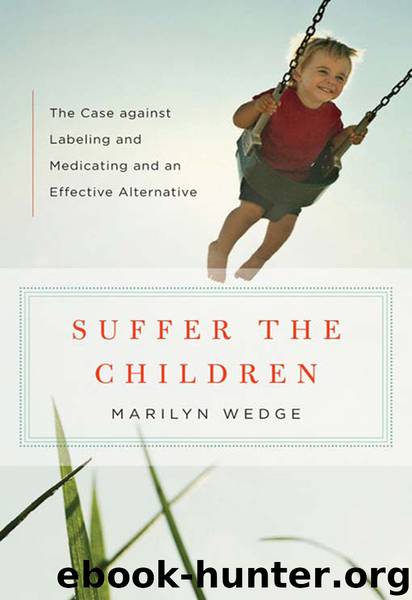Suffer the Children by Marilyn Wedge

Author:Marilyn Wedge
Language: eng
Format: epub
Publisher: W. W. Norton & Company
Published: 2011-07-13T16:00:00+00:00
When I first learned about the strategic dialogue as a therapy technique, I didn’t feel comfortable with the idea of using it with children. It had been developed for use with adults and has a quasi-hypnotic aspect to it. And, more important, as a family systems therapist, I was accustomed to resolving children’s problems by strategic-systemic techniques. I gave parents directives and reorganized families to put parents in charge of their children. I strengthened parental boundaries and sliced through enmeshed parent-child relationships by prescribing date nights and romantic weekend getaways for parents. I told parents to maintain their privacy by locking their bedroom door. I provided parents with ways to help their children soothe themselves—with music and story CDs or tapes—in order to free the marital bed from children. After abandoning play therapy many years ago and falling in love with systemic thinking, I felt resistant to any method of therapy that addressed the individual child instead of the family system.
But since I found the strategic dialogue so effective with older adolescents who were experiencing fears, anxieties, and compulsive behaviors, I thought that there was good reason to try this technique with younger children as well. I approached it cautiously, writing out scripts ahead of time. Today it is one of my most valuable interventions. It is a very gentle strategy, seemingly simple on the surface but actually complex. The questions are not aimless. As in the ancient Socratic dialogues, or the hypnotic techniques of Milton Erickson, the questioner has a final goal in mind and carefully sculpts her questions to reach that goal. By giving an illusion of alternatives, the questioner creates a new feeling right in the session that will be the beginning of a change in the child’s perceptions of herself and her world. So when I asked Katelyn if she felt like the invisible people just watched her or if they threatened to hurt her, I was hoping she would choose the less threatening alternative and begin to feel less frightened.
Parents who have observed me using the strategic dialogue are impressed with how it seems to help their child feel better, and they have asked me if they can use the technique themselves. After giving this question careful thought, I came to the conclusion that it probably wouldn’t work. The sequence of questions can be difficult to invent and must be tailor-made to the child’s individual problem. Creating the questions and asking them in a way that will bring about change is a subtle and complex art. I had to practice the strategic dialogue for more than a year before I got the hang of it. Of course, parents can take a lesson from the “paraphrasing” part of the strategic dialogue. They can listen carefully to what their child tells them and reflect back the child’s feelings, which in itself can help a child feel heard and understood.
Loneliness was a central theme in Katelyn’s family, and in many ways loneliness is one of the deepest problems of modern life.
Download
This site does not store any files on its server. We only index and link to content provided by other sites. Please contact the content providers to delete copyright contents if any and email us, we'll remove relevant links or contents immediately.
Rewire Your Anxious Brain by Catherine M. Pittman(18656)
Talking to Strangers by Malcolm Gladwell(13370)
The Art of Thinking Clearly by Rolf Dobelli(10489)
Mindhunter: Inside the FBI's Elite Serial Crime Unit by John E. Douglas & Mark Olshaker(9344)
Becoming Supernatural by Dr. Joe Dispenza(8217)
Change Your Questions, Change Your Life by Marilee Adams(7783)
Nudge - Improving Decisions about Health, Wealth, and Happiness by Thaler Sunstein(7709)
The Road Less Traveled by M. Scott Peck(7603)
The Lost Art of Listening by Michael P. Nichols(7506)
Mastermind: How to Think Like Sherlock Holmes by Maria Konnikova(7347)
Enlightenment Now: The Case for Reason, Science, Humanism, and Progress by Steven Pinker(7314)
Win Bigly by Scott Adams(7199)
The Way of Zen by Alan W. Watts(6614)
Daring Greatly by Brene Brown(6514)
Big Magic: Creative Living Beyond Fear by Elizabeth Gilbert(5774)
Grit by Angela Duckworth(5615)
Ego Is the Enemy by Ryan Holiday(5450)
Men In Love by Nancy Friday(5240)
The Laws of Human Nature by Robert Greene(5208)
